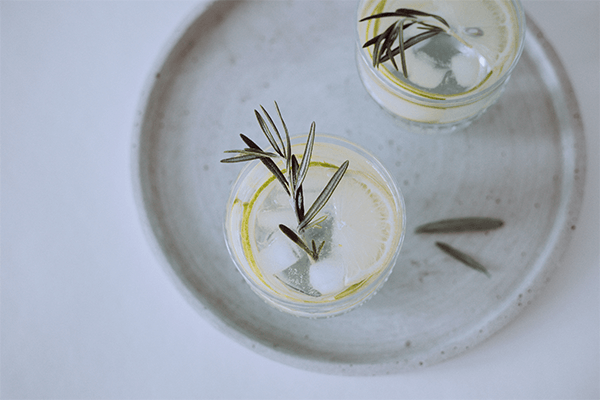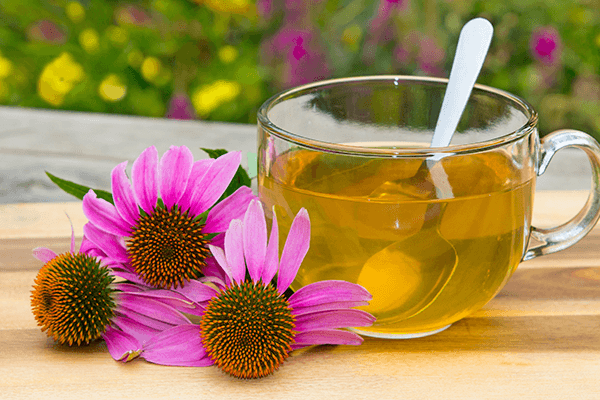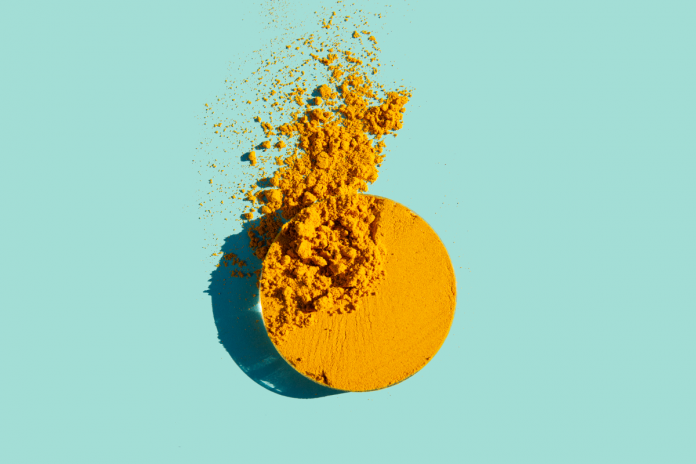Turmeric tea has been gaining lots of popularity recently (COVID-19 pandemic and beyond). Supporters of this superfood believe turmeric powder may be able to help support your immune system. Some even say turmeric tea and turmeric supplements may support a healthy response to inflammation.
But are the health benefits of turmeric tea actually backed by science?
If you’re curious whether that gorgeous golden milk latte in your social media feed is more nutritious than hype, this article has all the info you need. We’ll dive into the research on turmeric tea and even share a turmeric tea recipe you can make at home.
What is Turmeric Tea?
Turmeric tea is an herbal tea, which means it’s not made from Camellia sinensis tea leaves like black or green tea. Rather than steeping leaves, tea drinkers steep ground turmeric in cups of water.
And if you add milk to this tea, you’ll have the trending golden milk latte.
But what is turmeric, and where does it come from?
The turmeric root (often misspelled tumeric) is a rhizome in the ginger family. Fresh turmeric root is similar to fresh ginger root in appearance and texture from the outside. But unlike the pale yellow flesh of ginger, peeling back the skin of turmeric reveals a vibrant, bright yellow or orange pulp. Its bright color helped turmeric powder earn the nickname “Indian Saffron.”
In fact, India is the world’s largest producer and consumer of turmeric (1). Since it grows native to Southeast Asia, you’ll see turmeric in curry powder and spice blends along with black peppercorns, cumin, cardamom, cayenne, and cinnamon stick. You’ll also find turmeric in Asian curries and other traditional rice-based dishes and lentils from Ethiopia and South Africa.
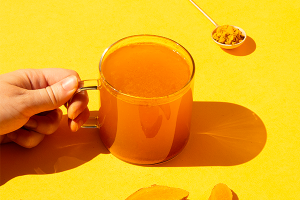
Therapeutic Uses of Turmeric in Traditional Cultures
Turmeric has been a staple in religious ceremonies and used medicinally in traditional Indian Vedic cultures for over 4,000 years (1)(2). In ancient Ayurvedic practices, turmeric was believed to help improve energy, digestion, and rheumatoid arthritis pain. It was also used to help alleviate gas, regulate menstruation, treat common respiratory conditions (such as asthma and allergies), lessen symptoms of a runny nose or cold, and provide support for liver disorders (1).
Research also points out that many Asian cultures use turmeric as an antiseptic to treat burns, cuts and bruises, since it contains an antibacterial agent (1).
Cultures in Pakistan and China used turmeric to treat stomach upsets and abdominal pain by mixing it with milk or water (1). Unani practitioners, an alternative medicine practice commonly found in India, turn to turmeric to improve circulation and rid the body of excess phlegm (1).
Curcumin: Turmeric’s Secret Weapon
The turmeric plant (Curcuma longa) contains curcumin, the chemical component responsible for its brightly-colored appearance and all of its bioactive powers.
Curcumin can be compared to piperine, which is a similar bioactive ingredient found in ground black pepper.
Curcumin touts incredible antioxidant properties to help reduce damage from harmful free radicals. And its purported anti-inflammatory properties have been studied both medicinally and to promote overall wellness (4).
The Top 7 Health Benefits of Turmeric
Despite centuries of therapeutic use across cultures, clinical research on turmeric here in the West is very limited. Here’s what we know about the potential health benefits so far:
1. Supports Healthy Digestion
A study of just eight subjects demonstrated that when people consumed curry packed with turmeric, they improved their bowel motility, which may support healthy digestion (1).
So even though more research is needed to confirm these findings, consuming turmeric in addition to probiotics and prebiotics may lead to a happier gut.
2. Support for Heart Health
In a meta-analysis of 11 studies comprising 734 participants, researchers saw a connection between turmeric and inflammation that could lead to heart disease. Curcumin supports a healthy anti-inflammatory response, which may help support the cells that line your blood vessels and heart to keep circulation flowing, support healthy cholesterol levels, and support healthy blood pressure levels (5)(6).
However, more studies are needed to confirm these results.
3. Promotes Healthy Joint Function and a Healthy Response to Inflammation
One small study using curcumin on 18 arthritic participants dates all the way back to 1980. Using a short, double-blind, crossover trial, patients were randomly given 1.2g of curcumin per day or 0.3g of a common arthritis prescription medicine known as phenylbutazone.
The researchers discovered that curcumin was just as effective as the prescription drug for supporting the body against swelling, joint stiffness, and how long it took participants to walk. Bonus: There were no unwanted side effects reported with the curcumin (3).
4. Supports Healthy Fasting Blood Sugar Levels
In one trial, researchers asked a male participant who had type 2 diabetes for 16 years to try turmeric. His fasting blood sugar averaged 140 mg/dl. But after using turmeric, his fasting blood sugar dropped to 70 mg/dl — a reduction of 50%! The participant stopped the turmeric for one week and noticed his fasting blood sugar went right back up to his initial 140 mg/dl reading (3).
In a larger randomized, double-blind, placebo-controlled study of 240 pre-diabetes patients (which means they were not yet diagnosed as type 2, but could be heading that way if nothing changed), study participants were given either a placebo or 1.5g of curcumin per day. Nine months into the study, 16.4% of those taking the placebo went on to develop type 2 diabetes. Yet not a single participant in the curcumin group did (3).
Again, we need more research to confirm these findings, but they’re promising.
5. Help Supporting Balanced Moods
Animal studies on curcumin consumption also showed that it may have an antidepressant effect, which is what led researchers to test it on a small group of 60 study participants.
Using a randomized observational study over six weeks, patients were either given 20mg of fluoxetine, an SSRI or selective serotonin reuptake inhibitor antidepressant, or 1000mg of curcumin, or a combination of both. The researchers found that the combination of both showed the most positive effect with supporting balanced moods (7).
6. Support Memory and Overall Neurological Health in Rats
To see how curcumin could affect memory and neurological health, scientists gave aging rats curcumin or corn oil daily for 12 days. They then performed behavioral assessments to see how each group fared.
The researchers also took blood and brain samples from the rats to further assess the effects of both substances.
What they found is that the curcumin group was able to perform their tasks faster and increase how far they traveled. They also noted that the curcumin group had decreased oxidative stress levels in their brain tissue (8). While more research on humans is clearly needed, this could potentially show that curcumin may be able to support memory and neurological health in the future.
What is Turmeric Tea Good For?
Turmeric tea benefits include support for:
-
- Healthy digestion
- A healthy response to inflammation
- Support for heart health
- Healthy fasting blood sugar levels
- Supporting balanced moods
- Support for memory
Plus, when you choose a fermented turmeric tea, you’ll have the added benefit of supporting a healthier gut balance.
What Happens When You Drink Turmeric Tea Everyday?
Consistent consumption of turmeric may be beneficial for your overall wellness.
Natural turmeric is low in carbohydrates, sugar-free, caffeine-free, and suitable for most diets (without harmful side effects).
So you may experience healthy digestion, a happier gut, healthier response to inflammation, healthy joints, supported heart health, and help supporting healthy blood sugar levels.

When Should I Drink Turmeric Tea?
Since turmeric tea is caffeine-free, you can safely enjoy it as your morning, afternoon, or evening cup of tea (or have it for all three!).
If you want to step up your tea game, many people turn their turmeric tea into a turmeric latte. You can sip this ultra-comforting drink to start your day, enjoy as a treat during the afternoon, or to wind down and relax before bedtime.
Is It Okay to Drink Turmeric Tea at Night?
Turmeric tea is absolutely okay to drink at night since it does not contain caffeine. You can safely enjoy it after dinner without worrying about it keeping you up at night.
You may also find that the hints of ginger and cinnamon in some turmeric tea varieties provide a decadent dessert-like quality to help you avoid sugary sweets post-dinner.
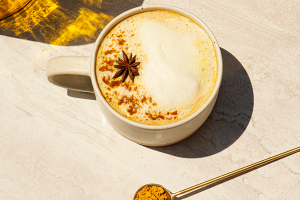
Turmeric Tea Recipe (and Golden Milk Latte Recipe)
If this is your first time learning about turmeric, you may be wondering how to make turmeric tea at home. While you could use ground turmeric, it’s much easier to use a packet of Electric Turmeric Tea Crystals.
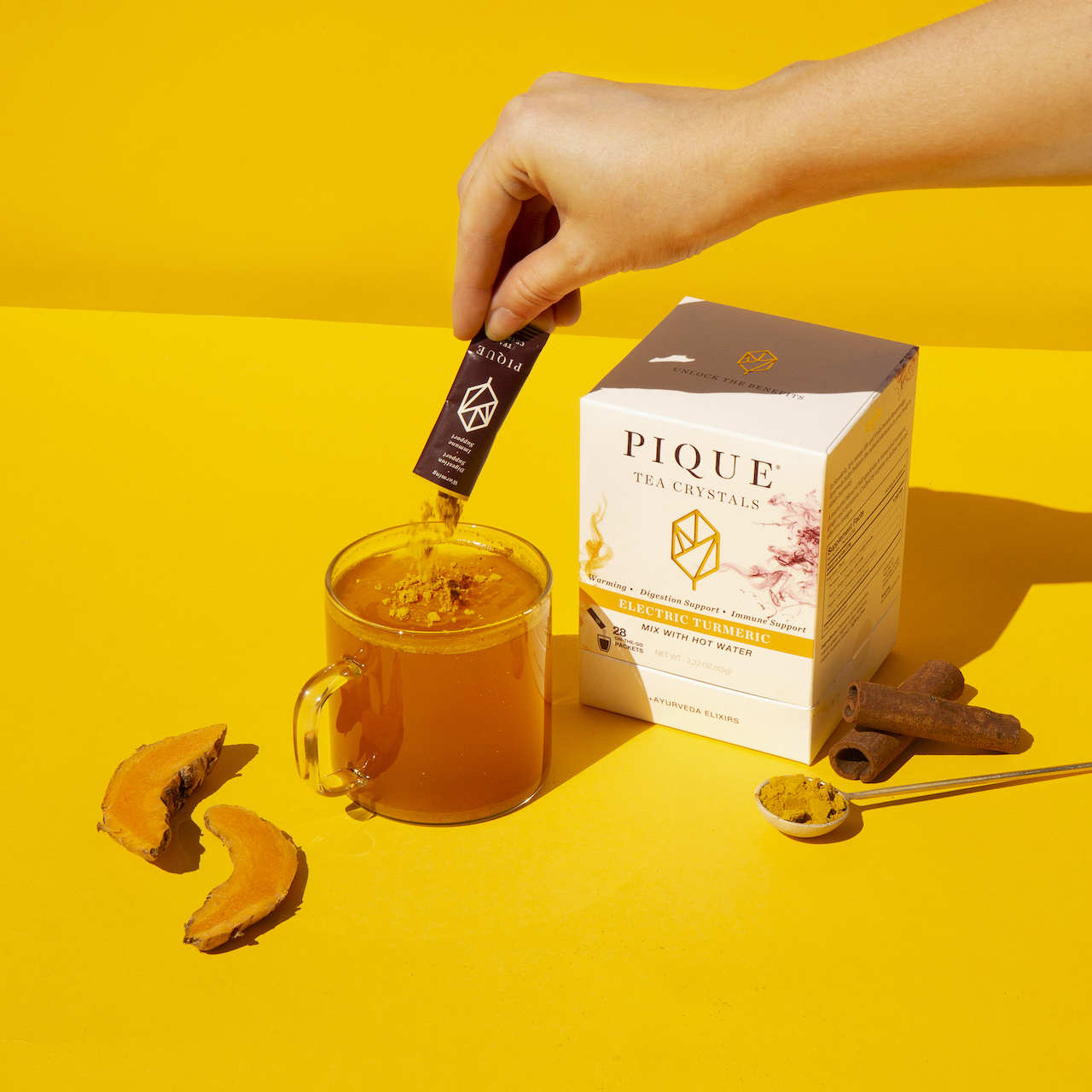
Pique Electric Turmeric
Invigorate your cells with Okinawa’s best-kept longevity secret. Delight your palate, sunup to sundown.
In addition to turmeric, these also provide pleasant hints of ground ginger and ground cinnamon to sip and smell. All you have to do is break open and pour the crystals into a cup of hot water (read: not boiling water), and enjoy!
You can also brew turmeric tea and pour over ice if you’d prefer iced tea.
Now, if you want that cafe-inspired and Instagram-worthy golden milk latte recipe, follow these four steps:
-
- Mix one packet of Electric Turmeric tea crystals in half a cup of hot water. Stir until dissolved.
- While that’s brewing, warm up 1 cup of your favorite milk in a small saucepan. We love coconut milk here, but almond milk, cashew, or oat work well too.
- Combine the half cup of turmeric tea with your cup of milk. Stir to combine, and voila! You can even use a milk frother to add a nice creamy, foamy head to your latte.
You can also try these three options to customize your golden milk latte:
-
- Like to sweeten your tea? Choose a natural sweetener such as raw honey, maple syrup, or stevia to taste.
- Want to jazz up your turmeric tea latte for a photo? Sprinkle some ground cinnamon, ground ginger, or a pinch of turmeric powder right on top.
- Need a satiating energy boost? Try adding a tablespoon of coconut oil to your latte.
After making just one golden milk latte, it may quickly become your new favorite (watch out chai tea latte and green tea latte!).
The other good news? There’s hardly any prep time, especially if you use the tea crystals. With a total time to brew under five minutes (the longest part is waiting for the boiling water), feel free to make this tea whether you’re in a rush or have more time to yourself.
Final Thoughts on Turmeric Tea
If you’ve made it to this point, you now know more about turmeric tea than most avid tea drinkers. While there may be several positive health benefits of turmeric tea, we definitely need more research to confirm them.
But if you’re wondering whether this bright yellow tea is worth adding to your tea rotation, the answer is a clear yes! This warming, caffeine-free tea is a perfect addition you can savor any time. Have a cup (or two!) of turmeric tea today, and let us know how it goes!


